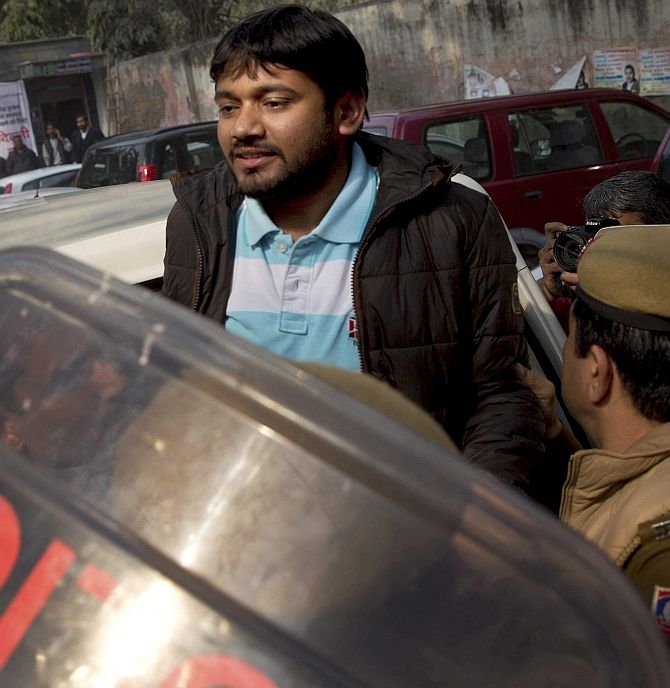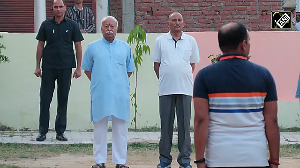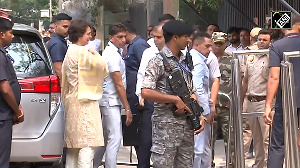Jawaharlal Nehru University Student Union president Kanhaiya Kumar, arrested in a sedition case, was on Wednesday granted interim conditional bail for six months by the Delhi high court, which said he will "not participate actively or passively in any activity which may be termed as anti-national".

The high court also enjoined on him, as president of JNU students union, that he "will make all efforts within his power to control anti-national activities in the campus."
"Taking into consideration the facts and circumstances, I am inclined to release the petitioner on interim bail for a period of six months," Justice Pratibha Rani said, while making it clear that the accused will have to cooperate in the ongoing investigation and present himself before the investigators, as and when required.
The judge also considered the family background of Kanhaiya, whose mother is an Anganwadi worker earning a paltry amount of Rs 3,000 on which the entire family survives, and ordered that he be released on furnishing a personal bond of Rs 10,000 and a surety of like amount.
Soon after he was granted bail, Kumar’s parents and brother expressed much a sigh of relief, reports M I Khan/Rediff.com.
“Hum sabhi khush hain, akhirkar jamanat mil gayee. Nyaya ki jeet hui (We are all very happy, in the end he got bail. Justice has prevailed),” Kanhaiya’s mother Meena Devi told Rediff.com.
Meena said she was restless earlier but is hopeful that her son will get justice. “I was waiting to hear this good news. I am relieved now,” Meena said.
"My son is not a terrorist and the world will know it soon. I have faith in him, he will fight the opponents who have framed him. For every mother her child is great, if he has committed mistake punish him but do not call him a terrorist. He is not one, he never will be," Devi added.
Kanhaiya’s father Jaishankar Singh, who is paralysed, said, “This isn’t merely our victory; this is a victory for the whole nation. Thousands upon thousands of people were on the streets demanding his release. We are extremely happy.”
Kanhaiya’s younger brother Prince Kumar said that hours before TV news channel break this news, hundreds of people have gathered at their house. “My house is full of people now, our family, relatives, neighbours, villagers and people from nearby villages have gathered to show support for us.”
“The last few days have been very stressful for us but his bail has come as a big relief. We hope things will be sorted soon and he will come out clean,” Prince added.
Prince told Rediff.com that no grand celebrations would follow Kanhaiya’s release. “We are simple people expressing our joy in the simplest of ways. Ma-Babuji are the happiest I’ve ever seen them,” he stated.
“Our parents will be able to speak with Kanhaiya on Thursday once he is released from Tihar Jail,” Prince said.
Whilst granting Kanhaiya bail the judge directed that the accused surety, “Should also be either a member of the faculty or a person related to him in a manner that he exercises control on him not only with respect to appearance before the court but also to ensure that his thoughts and energy are channelised in a constructive manner."
While giving monetary concession for furnishing the bond for release, the high court said Kanhaiya has to "furnish an undertaking to the effect that he will not participate actively or passively in any activity which may be termed as anti-national."
In the 23-page order, the judge said, Kanhaiya would not leave the country without the permission of the trial court and the person standing surety for him shall also furnish an undertaking on the lines similar to that of the accused.
The judge also observed that "during the period spent by petitioner in judicial custody, he might have introspected about the events that had taken place. To enable him to remain in the mainstream at present, I am inclined to provide conservative method of treatment."
The judge said, "Once the decision of releasing the petitioner on interim bail is taken, now the question comes as to what should be the amount for monetary security. In his speech dated February 11, 2016, the petitioner has claimed that his mother works as Anganwadi worker and earns Rs 3,000 per month on which the entire family survives.
"If this aspect is considered, then the amount required to be filled in the personal bond and surety bond cannot be so high as to put him in a position that he cannot avail the interim bail," the judge said.
"The time is ripe that while giving some concession to the petitioner on monetary aspect for purpose of furnishing the bond, he can be required to furnish an undertaking to the effect that he will not participate actively or passively in any activity which may be termed as anti-national.
"Apart from that, as President of JNU Students Union, he will make all efforts within his power to control anti- national activities in the campus," the high court said.
While laying down the conditions for Kanhaiya's release on interim bail, the high court said that the personal bond of Rs 10,000 and an undertaking with surety, who should preferably be a faculty member of JNU, will be to the satisfaction of concerned Metropolitan magistrate or the link magistrate with the condition that "he shall not leave the country without the permission of the court".
The high court took strong exception to the manner in which slogans were raised and protest staged by the students on the campus carrying photographs and posters of Parliament attack case convict Afzal Guru and Maqbool Bhat, mastermind of hijacking of a passenger airline to Lahore in 1971 who was hanged in 1984.
"The feelings or the protest reflected in the slogans need introspection by the student community whose photographs are available on record holding posters, carrying photographs, of Afzal Guru and Maqbool Bhat," the judge said.
The high court noted that Kanhaiya belongs to an intellectual class pursuing PhD from International School of Studies, JNU, which is considered as hub of intellectuals. The court said that his political ideology or affiliation has to be pursued within the framework of Indian Constitution as freedom of speech and expression is subject to reasonable restrictions under Article 19(2) of the Constitution.
"He may have any political affiliation or ideology. He has every right to pursue that but it can only be within the framework of our Constitution. India is a living example of unity in diversity. Freedom of expression enjoyed by every citizen can be subjected to reasonable restrictions under Article 19(2) of our Constitution," the judge said.
The high court said that the faculty of JNU has to play its role in guiding them to the right path so that they can contribute to the growth of the nation and to achieve the object and vision for which the university was established.
"The reason behind anti-national views in the mind of students who raised slogans on death anniversiry of Afzal Guru, who was convicted for attack on our Parliament, which led to this situation have not only to be found by them but remedial steps are also required to be taken in this regard by those managing the affairs of the JNU so that there is no recurrence of such incident," the judge said.
The high court also made strong remarks on the slogans raised by the accused students, saying they cannot claim protection under fundamental right to speech and expression particularly in view of the fact that the investigation into the case was at nascent stage.
It considered the entire incident "as a kind of infection" from which such students are suffering and needs to be cured "before becoming epidemic" and "surgical intervention" is required when the first line of treatment fails.
"The investigation in this case is at nascent stage. The thoughts reflected in the slogans raised by some of the students of JNU who organised and participated in that programme cannot be claimed to be protected as fundamental right to free speech and expression. I consider this as a kind of infection from which such students are suffering which needs to be controlled/cured before it becomes an epidemic,” the judge said.
“Whenever such infection is spread in a limb, effort is made to cure the same by giving antibiotics orally and if that does not work, by following second line of treatment. Sometimes it may require surgical intervention also. However, if the infection results in infecting the limb to the extent that it may become gangrene, amputation is the only treatment,” the judge said.
-- With inputs from PTI











 © 2025
© 2025